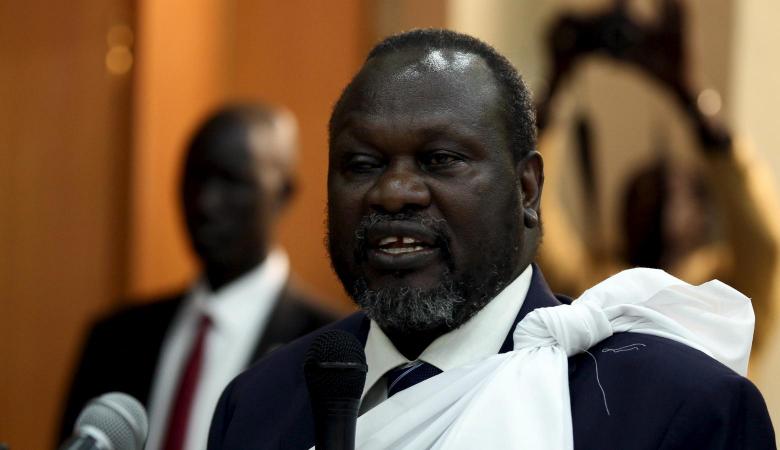London- Government spokesperson Michael Makuei has stressed that the internal situation of South Sudan is stable after First Vice President Riek Machar left its territories. Makuei urged Machar to refrain from any aggressive practices and to wait until next year’s elections in case he is interested in resuming his political journey.
Asharq Al-Awsat asked Makuei, “South Sudan celebrated the one year anniversary of the signing of the peace agreement by the government and the leader of rebels Riek Machar. However, the celebration was accompanied by the sound of gunfire. Do you think you enjoy a real peace?”
Makuei replied: “Peace was not reached because of Machar. When he came to Juba last April he had the intention to take over the administration by force. He failed to do that and that’s when he fled. Machar abandoned his soldiers and the leaders of his movement and he is in Khartoum.”
“But don’t you think that appointing Taban Deng Gai as a replacement for Machar complicated the matter?” asked the newspaper.
“This is not true. We tried to save the agreement and Taban Deng Gai is a man of peace not to mention that he was the chief of negotiations. Furthermore, he was not on good terms with Machar during the negotiations,” answered Makuei.
“Many consider that dismissing Machar does not serve peace given that he was the one who signed the agreement in Addis Ababa, what do you have to say about that?” asked Asharq Al-Awsat.
The government spokesperson denied that, saying he “is not a man of peace but a man of war and we think that peace was reached once he left South Sudan. If his health condition gets better we ask him to stop his aggressive practices and to wait for the elections of 2018 in case he had the will to return to political life.”
“So you think that Machar’s role is totally over? President Salva Kiir did not carry out any phone calls with him after arriving in Khartoum?” questioned the newspaper. “No phone calls between Kiir and Machar,” was the answer.
Asharq Al-Awsat said, “You country is suffering wars among different ethnic groups and tribes. After the independence, the condition worsened compelling many observers to call South Sudan a failed state or a country of internal wars.”
He commented that, “South Sudan is no different than many other countries in all continents that passed through tough conditions after independence so why should it be called a failed state? It is a phase that will end one day. True, we have wars but not like those in Iraq, Syria, Yemen, Libya and even the U.S.”
“But your economy almost collapsed, the wars are ongoing and you are internationally isolated. Aren’t these the indicators of a failed state?” asked Asharq Al-Awsat.
“The condition of South Sudan is still better than many other countries. However enhancing the economy is on top of our to-do list,” said Machar.
Asharq Al-Awsat asked, “Rumors spread that the elections might be held before the transitional phase ends, after less than one year. Is this true?”
The answer of Machar was as follows, “The timing of the elections is based on the implementation of the peace agreement. The quicker we implement it, the higher chances we have to agree with parties on early elections. However if the pace was slow, we will have to wait until 2018 as the agreement states.”
“Doesn’t South Sudan share some tense relations with neighboring countries?” asked the newspaper.
“Not at all. South Sudan has no conflict with any neighboring country and interfering in other (countries’) affairs has never been part of our policy. However some states insist to cause us trouble. In North Sudan, for example, Machar’s forces are being trained to rage a war against us,” said the government spokesperson.
Asharq Al-Awsat questioned, “Is it true that Israel provided you with weapons through Uganda?”
“We did not receive arms from Israel or any other party but Israel does have a presence in Africa just as it is present in some Arab countries through diplomatic representation.
“Speaking of Arab countries, how would you describe relations with them?” asked the newspaper. Makuei described ties as “perfect.”
